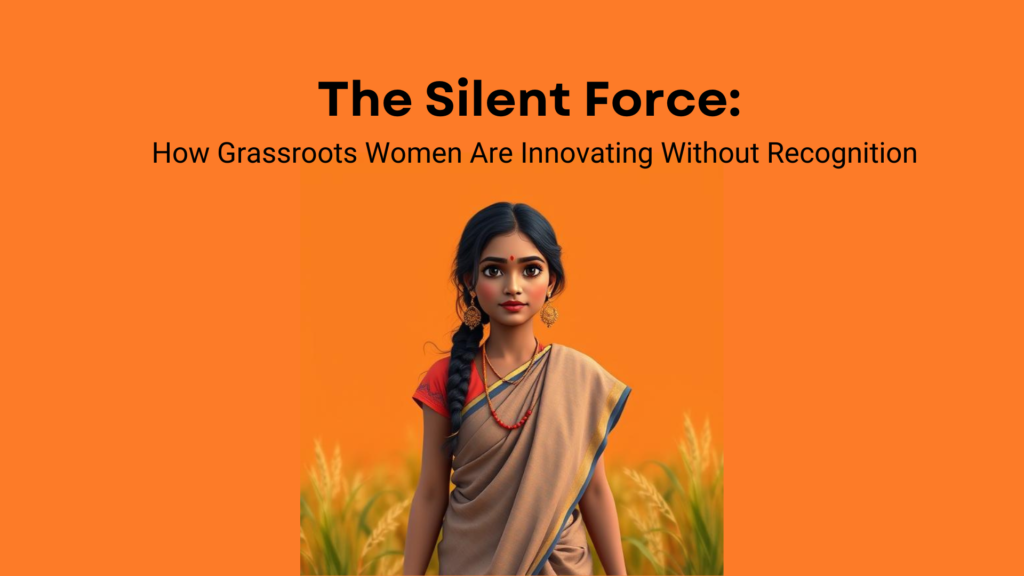When Innovation Goes Unrecognized
When we hear the word “innovation,” we often picture white coats in labs or startups in sleek glass offices. But across India’s rural villages, forest communities, and small towns, women are innovating every day—often with little more than lived experience and necessity as their tools.
These women are solving real problems—food storage, menstrual health, sustainability, plastic waste—but without access to the intellectual property (IP) ecosystem, their inventions go unrecognized, unprotected, and uncelebrated.
This blog explores real stories of women innovators in India’s grassroots economy, examines why the IP system often fails them, and calls for a more inclusive future.
- Rahibai Soma Popere – The Seed Mother of Maharashtra
A tribal woman from Ahmednagar, Rahibai has preserved over 122 indigenous seed varieties, created community seed banks, and taught over 3,000 farmers the principles of organic farming. Her work has global sustainability implications, yet is categorized as traditional knowledge and remains underprotected in IP law.
IP Insight: Knowledge like hers can fall under Plant Variety Protection or Traditional Knowledge Systems, but India’s IP framework still lacks mechanisms to proactively record, value, and protect these innovations.
- Bijiyashanti Tongbram – Lotus Silk Entrepreneur from Manipur
Bijiyashanti developed a technique to extract silk from lotus stems—producing eco-textiles and zero-waste herbal tea. Her innovation has employed hundreds of rural women and built a sustainable enterprise.
IP Insight: Her process could be protected under Design Rights, Geographical Indications, or Trade Secrets. But the lack of localized IP legal support means she’s vulnerable to imitation.
- Nasira Akhter – The Polythene Problem Solver from Kashmir
Despite limited schooling, Nasira invented a herbal solution that degrades polythene. She was awarded the Nari Shakti Puraskar but hasn’t been able to scale or patent her solution.
IP Insight: A formula like this is patentable, but without awareness, legal aid, or financial access, the innovation risks dying on paper—or worse, being co-opted.
- Anushree N – The 12-Year-Old Agricultural Inventor
Anushree built a multi-functional farming tool from bicycle parts that saves labor and water. Thanks to support from the National Innovation Foundation (NIF), her patent was filed, and she’s become a national symbol of young innovation.
IP Insight: Anushree’s story shows what happens when support structures do exist—accessible filing, mentorship, and funding led to protection and recognition.
- Drone Didis of Kashi – Precision Farming, Rural Empowerment
Trained by Krishi Vigyan Kendra, these rural women fly drones for pesticide spraying, covering thousands of acres and earning sustainable incomes. Their work showcases service-based innovation—but without IP strategies, their brand and model are unprotected.
IP Insight: While there’s no patent on drone piloting, business process innovation and service branding can—and should—be protected through trademarks and licensing agreements.
The IP Ecosystem: Still Out of Reach for Most
Despite India’s efforts through schemes like KAPILA and Start-up India, most grassroots women innovators face:
- Cost barriers: Filing a patent or GI tag can cost thousands—out of reach for many.
- Lack of awareness: IP isn’t part of rural education or livelihood schemes.
- Language and cultural gaps: Legal jargon and English-only resources alienate local creators.
- Institutional opacity: No easy way to verify if an innovation qualifies for IP protection.
Result: Innovations remain unprotected, copied, and commercialized by others without attribution.
What Inclusive Innovation Looks Like
A more just and inclusive IP framework could include:
✅ Decentralized IP Helpdesks: Local centers in rural areas to advise and assist.
✅ Culturally relevant education: Using regional languages, stories, and community facilitators.
✅ Flexible protection models: Oral knowledge and community-held ideas need protection that isn’t solely documentation-based.
✅ Public funding & incentives: Seed funds for patent drafting and design registration.
✅ Partnerships with NGOs & academic IP cells: To bridge the legal-technical gap.
RAS Intellect is actively working on many of these fronts—through school outreach, RASPREP trainings, and collaborations with academic incubators.
Call to Action: Read. Reflect. Reach Out.
If you’re a policymaker, educator, IP expert, or innovator, ask yourself: who is missing from the IP landscape?
- Can your institution host a legal IP camp for rural women?
- Can you help a grassroots woman innovator draft her first design application?
- Can you amplify their stories?
Let’s co-create an IP ecosystem where no woman innovator is left behind.
Reach out to us at info@rasintellect.com to collaborate or support.
From Grassroots to Global
Innovation doesn’t only live in labs and startups. It’s in the hands of women who grow, weave, build, and solve—every single day. Unless we recognize and protect their contributions, we risk losing some of the most authentic, sustainable, and indigenous solutions the world has to offer.
Let’s not let that happen. Let’s make IP truly inclusive, accessible, and empowering.





